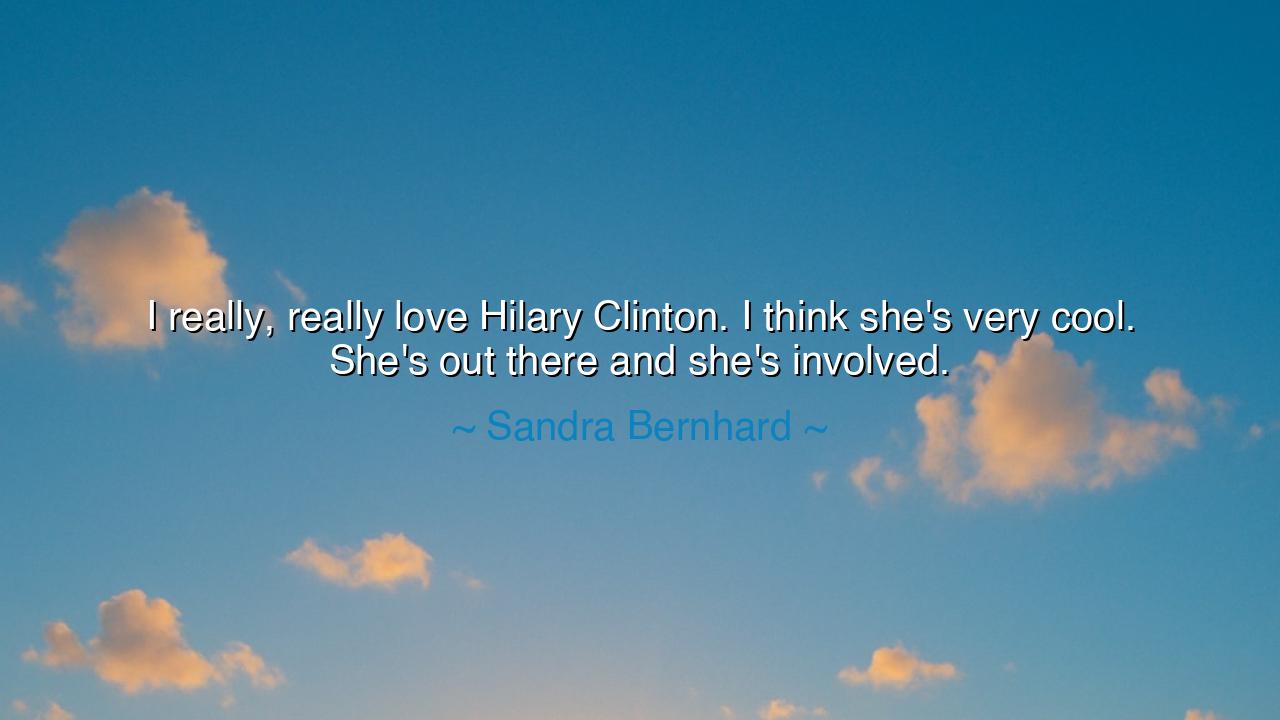
I really, really love Hilary Clinton. I think she's very cool.
I really, really love Hilary Clinton. I think she's very cool. She's out there and she's involved.






In the words of Sandra Bernhard, we are offered an expression of admiration for Hillary Clinton, a figure who embodies the values of dedication, courage, and active engagement. Bernhard’s praise highlights Clinton’s outspokenness and commitment to being involved in the world around her—qualities that set her apart in the eyes of many. Bernhard calls attention to Clinton’s coolness, not as a superficial trait, but as an expression of her authenticity, her willingness to step into the arena and confront the complex, often challenging issues of the day. This quote reflects not only admiration for Clinton’s character but for the type of leadership that is needed in the world: one that is active, involved, and deeply connected to the needs of the people.
The ancients, too, understood the value of involvement and leadership that was both courageous and authentic. Pericles, the Athenian leader, was celebrated for his direct involvement in the governance of Athens. He didn’t retreat into the background but was present in the affairs of the city, facing challenges and leading with integrity and vision. Pericles’ ability to maintain the respect of his people was due in part to his willingness to engage with them directly, understanding their concerns and guiding them toward a better future. Much like Clinton, Pericles was admired not just for his intellect but for his active participation in shaping the world around him.
Consider also the example of Joan of Arc, a young woman who led the French army to victory against the English in the Hundred Years' War. Despite her youth and the opposition she faced, Joan’s involvement in the war was a direct challenge to the gender norms of her time. Her leadership, much like Clinton’s, was rooted in action and determination, and she quickly became a symbol of strength and resilience. Joan did not sit on the sidelines; she led with courage, engaging in the struggles of her nation with passion and conviction. Both Clinton and Joan exemplify the timeless value of active involvement and taking action for a cause greater than oneself.
In the context of more recent history, we can draw parallels to the civil rights movement led by figures like Martin Luther King Jr., whose leadership was defined by his visibility and active involvement in the fight for equality. King’s involvement was not simply symbolic; it was rooted in his presence in marches, his speeches, and his personal commitment to changing the system from within. Like Clinton, King was not someone who could be overlooked—his involvement in the struggle for justice was both public and deeply personal. His legacy reminds us that leadership requires bold action and a willingness to be in the public eye, challenging systems of oppression and working toward a future of equality and justice.
Bernhard’s admiration for Clinton’s coolness can be understood as a recognition of her uncompromising nature in a world where public figures are often expected to conform to popular opinions or expectations. Clinton’s ability to maintain her authenticity, despite the many pressures she faced, is a mark of true leadership. This reflects the ancient virtue of fortitude—the ability to maintain one’s principles and identity in the face of adversity. Socrates, the great philosopher, was a figure who exemplified this courage and authenticity. He was unafraid to challenge the status quo, even when it meant facing death. His commitment to truth and integrity in his actions, regardless of the consequences, reflects the same qualities that Bernhard admires in Clinton. Both individuals, though living in vastly different times, embody the virtue of courageous authenticity.
The lesson here is that true leadership is not just about holding a position of power, but about being actively involved, engaged, and willing to be authentic in the face of challenges. As we navigate our own lives, we should seek to be like Hillary Clinton, Joan of Arc, and Martin Luther King Jr., individuals who did not shy away from their roles in shaping the future but instead embraced the responsibility with passion and purpose. Leadership comes from being present, from facing the difficulties of life with courage and determination, and from holding firm to one’s beliefs, even when it is difficult.
In practical terms, this means stepping into leadership roles, no matter how small or large, and committing ourselves to active participation in the issues that matter to us. Whether in our careers, communities, or personal relationships, we can follow the example of those who led with authenticity and engagement, not shying away from the hard work of making a difference. Just as Clinton took on challenges with unwavering resolve, we too can make the world a better place by being active, involved, and true to our values. Let us remember that leadership, at its core, is about making a real difference, not by standing on the sidelines, but by taking action and inspiring others to do the same.






AAdministratorAdministrator
Welcome, honored guests. Please leave a comment, we will respond soon